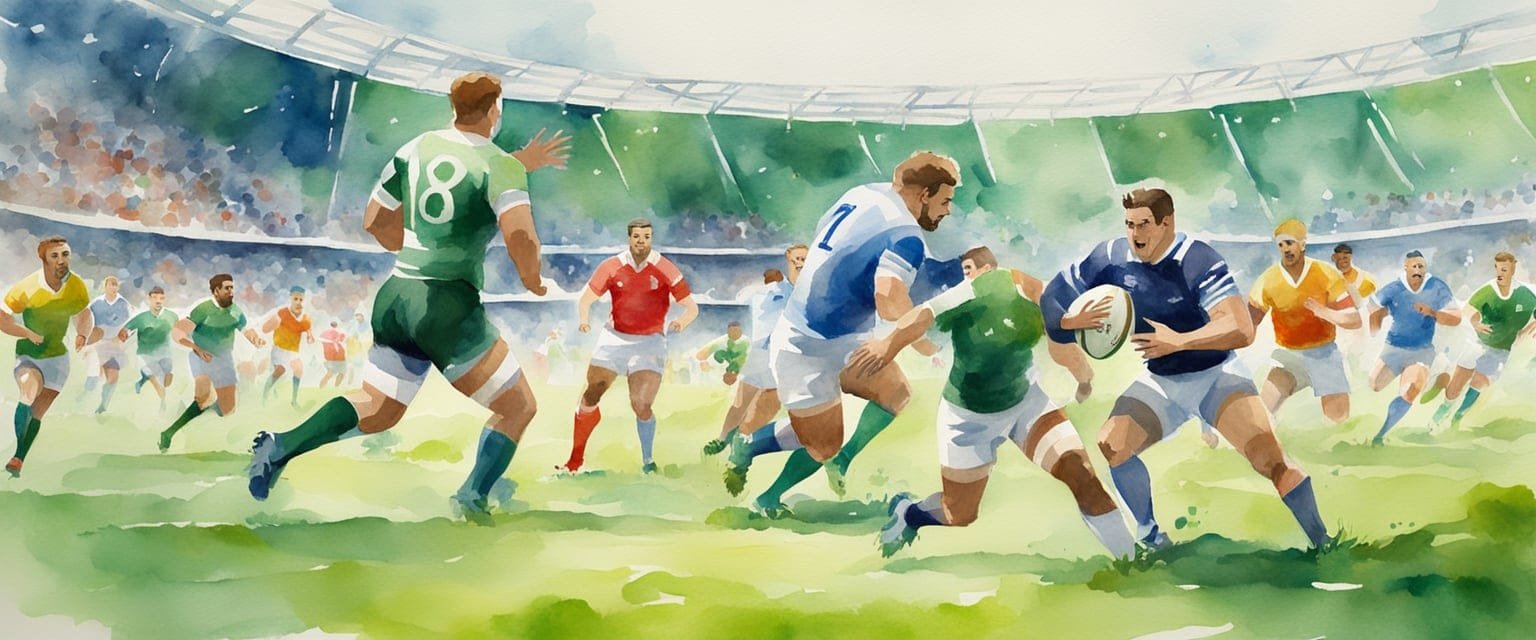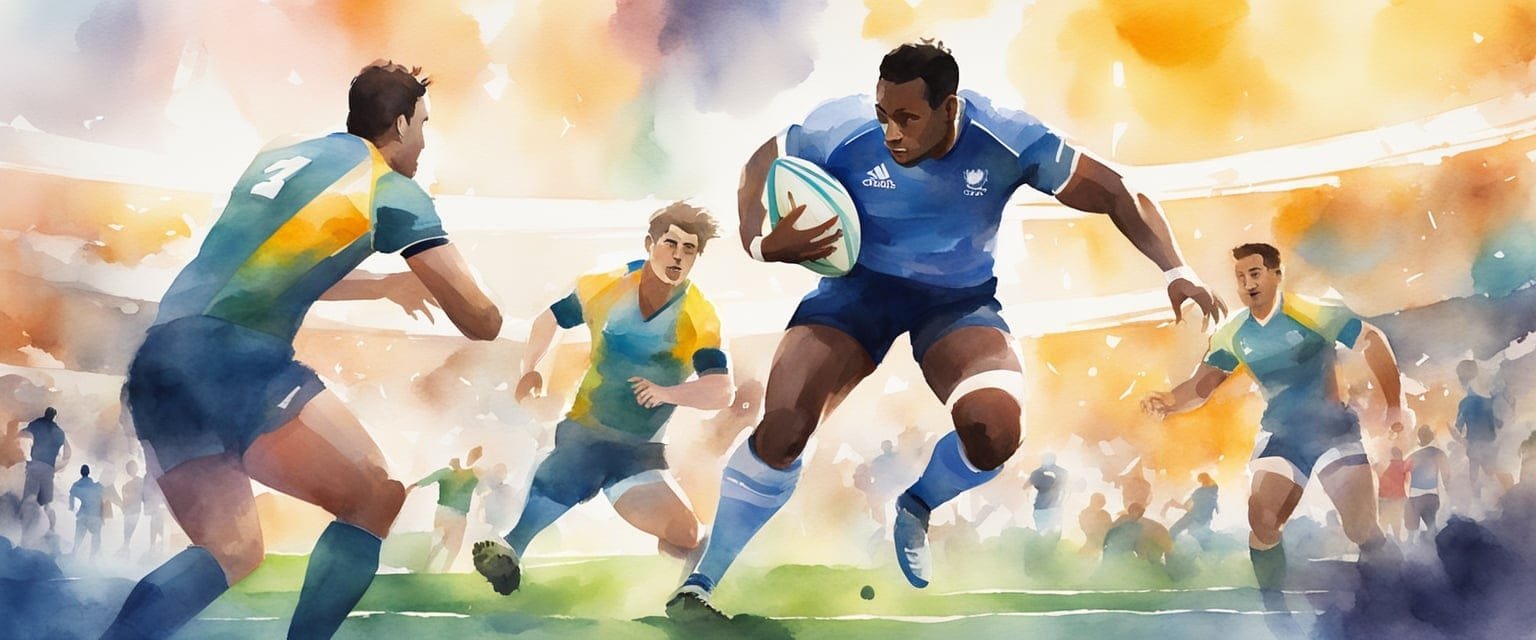Rugby sevens has rapidly gained popularity, especially with its inclusion in the Olympics. As I dive into this ultimate guide to Olympic Rugby Sevens, you’ll discover the thrilling format, the major teams and players, and the exciting atmosphere at events like Paris 2024. Whether you’re a longtime fan or new to the game, there’s much to explore about this fast-paced sport.

As I take you through the history of rugby sevens and how it evolved into an Olympic event, you’ll learn about key players who have made their mark on the game. The Olympics not only showcase incredible talent but also highlight the global impact and future potential of rugby sevens. Through this guide, I aim to enhance your understanding and appreciation of the sport.
Get ready to immerse yourself in the world of Olympic Rugby Sevens, where the stakes are high and the excitement is palpable. You’ll find everything you need to know about the game, its legacy, and what to expect at the upcoming Olympics.
Key Takeaways
- Rugby sevens combines speed and strategy in a unique format.
- The upcoming Paris 2024 Olympics will feature exciting matches and top teams.
- The sport has a growing global influence and a bright future ahead.
History of Rugby Sevens

I find the history of Rugby Sevens fascinating. The game began in 1886 in Melrose, Scotland. It started as a fun way to raise money for the local rugby club.
Over the years, Rugby Sevens gained popularity around the world. It became a mainstay at various tournaments, notably the Hong Kong Sevens, which started in 1976. This event helped showcase the speed and excitement of the game.
In 2009, the International Olympic Committee decided to add Rugby Sevens to the Olympic Games. This was a significant milestone for the sport. The first Olympic tournament took place at Rio 2016. I remember it being an exciting event, with Fiji winning the men’s gold and Australia taking home the women’s title.
Rugby Sevens returned for the Tokyo 2020 Olympics, which were held in 2021 due to the pandemic. It was thrilling to watch the teams compete for glory once again.
Looking ahead, the sport will feature in the Paris 2024 Olympics. The matches will be held in France, and I can’t wait to see how the men‘s and women‘s teams perform. Each tournament brings new talents and unforgettable moments.
Understanding the Game
Rugby Sevens is an exciting, fast-paced variation of traditional rugby. It has unique rules, a different scoring system, and a specific field layout that sets it apart. Let’s explore these key aspects to better understand how the game is played.
The Basics of Rugby Sevens
Rugby Sevens is played with seven players on each team, unlike the fifteen in traditional rugby. Matches consist of two halves, each lasting seven minutes. If the score is tied, there can be extra time.
The objective is to score points by touching the ball down in the opponent’s in-goal area, which is called a “try.” Teams must use skills like passing, running, and tackling to gain territory and create scoring opportunities. The game is known for its speed and strategy, making it thrilling to watch and play.
Scoring System and Points Calculation
In Rugby Sevens, there are several ways to score:
- Try: 5 points for touching the ball down in the in-goal area.
- Conversion: 2 additional points if the kick after a try goes through the goalposts.
- Penalty Kick: 3 points can be scored if a referee awards a penalty for a foul.
- Drop Goal: 3 points for a goal scored during play.
It’s essential for players to understand these scoring methods, as every point counts in such a fast-paced game. Strategy often involves deciding when to attempt different types of scoring.
Field Layout and Player Positions
The Rugby Sevens field is typically 100 meters long and 70 meters wide. Each team occupies one half of the field, trying to outmaneuver the other.
Player Positions:
- Forwards: Typically consist of three players. They handle the physical aspects of the game, like scrums and rucks.
- Backs: The other four players focus on speed and skill, handling the ball and scoring tries.
A clear understanding of player roles is crucial to team success. The layout allows for quick changes in strategy, as players must adapt to opponents’ movements.
Major Teams and Players

Rugby Sevens features a mix of powerful nations and exceptional players. These teams showcase great skill and teamwork, creating excitement for fans around the world. Let’s dive into some of the top nations and standout athletes in this dynamic sport.
Top Performing Nations in Rugby Sevens
Fiji: Known for their flair and speed, Fiji has won multiple World Series titles. Their unique style makes them a favorite in every tournament.
New Zealand: With a rich rugby history, New Zealand consistently fields strong teams. They are known for their tactical play and have won Olympic gold.
South Africa: The Blitzboks are a formidable force. Their robust defense and relentless attack often lead them to victory in major competitions.
Australia: Always a contender, Australia combines skill and determination. Their recent performances show they’re ready to compete for gold.
France: Playing on home soil in Paris 2024, France hopes to leverage their crowd support. They have shown they can compete with the best in recent tournaments.
Star Players to Watch
Among the talented athletes, a few stand out:
Antoine Dupont (France): A key player, Dupont is known for his agility and quick decision-making. His leadership on the field is vital for France’s success.
Michael Hooper (Australia): Although primarily known for 15s, his experience brings depth to the sevens circuit. He’s a fierce competitor and smart player.
Levi (United States): A rising star, Levi’s speed and footwork make him a player to watch. He’s been making waves in the international scene.
Kildunne (Great Britain): Her dynamic play and scoring ability make her an exciting player. Kildunne is one to keep an eye on as the competition heats up.
These nations and players play a crucial role in shaping the Rugby Sevens landscape. Their skills and tenacity promise an exhilarating Olympic Games.
Olympic Rugby Sevens Format
In Olympic Rugby Sevens, the competition is structured to ensure an exciting blend of skill, speed, and strategy. Understanding the format helps me appreciate how teams progress through various phases, competing for medals across both men’s and women’s tournaments.
Tournament Structure and Phases
The tournament begins with a pool stage, where teams are divided into three pools for the men’s and women’s events. For example, I might see Men’s Pool A, Men’s Pool B, and Men’s Pool C. Each pool consists of four teams, and they play each other in a round-robin format.
The top two teams from each pool advance to the Quarter-Finals. In these knockout rounds, teams face off, with winners progressing to the Semi-Finals. Losing teams in the quarter-finals will move to classification matches. Ultimately, the winners of the semi-finals compete for the Gold Medal in the final match, while the semi-final losers face off in the Bronze Medal Match.
Gender-Specific Competitions
The Olympic Rugby Sevens features separate competitions for men and women. Each gender has its own tournament, ensuring the spotlight is equally shared. Both tournaments follow the same structure with pools and knockout rounds.
The women’s competition also includes three pools, and teams, just like the men’s, aim to become medallists. The excitement is palpable as I watch teams compete for the Gold, Silver, and Bronze medals. This format allows each gender to showcase their unique skills and talents on a significant stage.
Classification Matches and Medal Rounds
In addition to the medal matches, there are classification matches for teams finishing outside the semi-finals. For instance, teams placed third in their groups enter matches to determine their final rankings. This means I can see teams battling for positions from 5th to 8th and 9th to 12th.
The tournament culminates in the medal rounds, featuring intense matches. The Gold Medal Match decides the top team, while the Bronze Medal Match determines who takes home the silver. These matches are critical, as each team’s performance can lead to highly coveted medals and an unforgettable Olympic experience.
Preparing for the Olympic Stage

As athletes prepare for the Olympic stage, effective team training and strong physical and mental conditioning are crucial. Together, they build character and teamwork skills, making all the difference in high-pressure situations.
Team Training and Strategy
In team training, I focus on building strong communication and trust among teammates. Each practice session includes drills that enhance our tactical understanding. We analyze game footage to identify our strengths and weaknesses.
I also emphasize specific formations and plays for different opponents. This helps us respond effectively during matches. Additionally, practicing under simulated pressure mimics the Olympic environment, preparing us for the intensity of competition.
Having regular team-building activities outside the training field fosters unity. These experiences create a bond that translates onto the field when the stakes are high.
Physical and Mental Conditioning
Physical conditioning is key. I incorporate strength training, speed drills, and agility exercises into my routine. This tailored approach boosts my performance and reduces the risk of injuries.
Mental conditioning is equally important. I practice visualization techniques to prepare for matches. Imagining myself in different game scenarios helps me stay calm and focused.
Mindfulness and relaxation techniques are also part of my regimen. They help me manage stress during competitions. I take time for reflection and positive affirmations to build resilience, which is essential for success at the Olympics.
Key Venues and Facilities
The main venue for rugby sevens during the Olympic Games Paris 2024 will be the Stade de France. This stadium is located in Saint-Denis, just north of Paris.
I find it exciting that the Stade de France can hold over 80,000 fans. This means a lively atmosphere for the matches. The facility is known for its modern design and excellent amenities.
In addition to the main stadium, there will be fan zones set up around Paris. These areas will provide fun activities and big screens to watch the games. It’s a great way for fans to enjoy the excitement of rugby sevens, even if they can’t make it to the stadium.
The organizers are focusing on creating a welcoming environment at all venues. Facilities like restrooms, seating, and food stalls will be well-maintained.
Safety measures will also be prioritized to ensure a secure experience for everyone. Access for people with disabilities will be made easier at all venues.
Rugby sevens at the Olympics is not just about the matches; it’s about the whole experience. The facilities and venues at Paris 2024 will play a big role in making those moments memorable for fans and players alike.
Global Impact and Future of Rugby Sevens
Rugby sevens has seen remarkable growth and popularity around the world. The Olympic Games have played a significant role in this expansion. As I dive into the details, I’ll share how this fast-paced game is evolving globally.
Growth and Popularity Worldwide
Since rugby sevens joined the Olympics in 2016, its appeal has soared. Events like the Olympics in Rio de Janeiro showcased the sport to a larger audience, sparking new interest. Major tournaments draw large crowds, with fans eagerly cheering for their teams.
In the recent competition, defending champions France clinched the gold in the men’s tournament, further highlighting rugby sevens’ allure. Women’s rugby sevens is also gaining traction, with teams like the USA and Australia showing strong performances.
The fan base is growing in emerging nations, with more young players taking up the sport. Rugby sevens is becoming a staple in schools and colleges, promoting teamwork and fitness.
Evolution of the Sport Post-Olympics
The aftermath of the Olympics has ushered in a new era for rugby sevens. National teams now invest more in training and development. This focus has elevated the level of play, making matches more competitive.
I’ve noticed a shift in broadcasting too. Major networks are showcasing rugby sevens events, increasing visibility. This exposure helps attract sponsors, which provides more resources for teams and tournaments.
I think one of the most exciting aspects is the talented players coming to the forefront. As the game evolves, innovative strategies and skills are emerging, particularly among the women’s teams.
The future looks bright for rugby sevens as it captures hearts around the globe. The sport continues to thrive, promising thrilling moments for fans and players alike.
Fan Experience

Attending Olympic Rugby Sevens is an exciting journey that allows fans to fully immerse themselves in the vibrant culture surrounding the sport. From engaging with various activities to utilizing the latest media tools, there are many ways to enhance the experience.
Engaging with Rugby Sevens Culture
When I think of the Rugby Sevens culture, I see passionate fans, exciting events, and strong communities. The atmosphere at the matches is electric. I love meeting fellow fans and sharing the joy of supporting my favorite teams.
Throughout the tournament, there are often events like fan zones and interactive sessions. These spaces offer games, food from different cultures, and opportunities to meet players. I enjoy participating in these activities, which reflect the spirit of rugby. Staying connected through social media also keeps me informed about the latest news and events.
Utilizing Media and Apps
The Rugby Sevens experience is enhanced by modern media and technology. I often use the HSBC Sevens App to keep track of scores, schedules, and player stats. This app helps me stay updated in real-time, ensuring I don’t miss any critical moments.
Social media platforms are also fantastic for engaging with fellow fans. I participate in discussions and share my thoughts on matches, which deepens my appreciation for the game. Regular updates from official sites keep me informed about team news and other essential information. This connection through media makes me feel like I’m a part of the action.
Olympic Rugby Sevens Legacy
The legacy of Olympic Rugby Sevens is truly inspiring. Since its debut in 2016, this fast-paced game has changed how many view rugby.
Winning an Olympic Gold medal is a dream for athletes. Competing on such a grand stage showcases their hard work and talent. This achievement boosts their visibility and helps grow the sport globally.
The Women’s Gold Medal competition has also played a pivotal role. It highlights the incredible skills of female athletes. This visibility encourages young girls to pursue sports, reshaping perceptions of women’s athletics.
The impact of these competitions goes beyond medals. They foster a sense of unity and national pride. Fans rally around their teams, creating vibrant atmospheres at events.
Here’s a quick look at the importance of medals in this legacy:
| Medal Type | Importance |
|---|---|
| Gold | Represents the pinnacle of achievement |
| Silver | Acknowledges strong competition |
| Bronze | Celebrates perseverance and talent |
For many athletes, these experiences shape their careers. The friendships and rivalries formed during these tournaments last a lifetime.
As I follow the journey of Olympic Rugby Sevens, I feel excited for its future. The legacy continues to inspire new generations of players and fans around the world.
Frequently Asked Questions

I often get questions about Rugby Sevens in the Olympics. Here are some important details about match duration, scoring, rules, tournament format, schedule, and where to watch.
What is the match duration for Rugby Sevens in the Olympics?
Each Rugby Sevens match in the Olympics lasts for 14 minutes. This is divided into two halves of seven minutes each. If the score is tied at the end, a sudden-death extra time may be played to determine the winner.
How does the scoring system work in Olympic Rugby Sevens?
In Rugby Sevens, teams score points by getting the ball into the opponent’s end zone. A try is worth five points, a conversion kick is worth two points, and a penalty or drop goal is worth three points. Scoring can happen quickly, leading to exciting matches.
What are the basic rules of Rugby Sevens for the Olympics?
Rugby Sevens has a few key rules. Each team has seven players, and they must pass the ball backward. Players cannot tackle opponents above the shoulders, and offside rules apply. Matches are fast-paced, so teamwork and strategy are important.
Can you explain the format of the Olympic Rugby Sevens tournament?
The tournament has a pool phase followed by knockout rounds. Teams are divided into pools, where they compete to earn points. The top teams from each pool then advance to the quarter-finals, semi-finals, and finals to compete for medals.
What is the schedule for Rugby Sevens at the 2024 Olympic Games?
Rugby Sevens at the Paris 2024 Olympics will take place from July 24 to July 30. The matches will be held at the Stade de France. Make sure to check the schedule for specific match times and days.
Where can I watch Rugby Sevens during the 2024 Olympic Games?
You can watch Rugby Sevens through various broadcasting networks and streaming services that cover the Olympics. Check local listings for options that will air the matches live, so you don’t miss any of the action.

